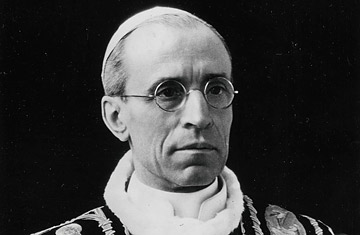
Pope Pius XII
Pope Benedict XVI's mostly warm but sometimes chilly relationship with the worldwide Jewish community may have just hit a major ice patch. On Thursday, Benedict put his moral weight (though not yet his signature) behind the cause for sainthood for Pope Pius XII, the wartime Pontiff who many Jewish leaders criticize for not having done enough to oppose the Holocaust.
One of the German Pope's many gestures of goodwill toward Jews during his three-year papacy was to effectively suspend the internal Vatican process that leads to sainthood for Pius, citing a need for a "period of reflection." Now, however, Benedict appears to have finished his own reflecting on the historical virtues of the Italian Pope who reigned from 1939 to 1958. At a special Mass on Thursday marking 50 years since Pius' death, Benedict praised his wartime predecessor's actions to save Jews and called on Catholics to "pray that the cause of his beatification goes forward smoothly." Beatification is the final step before canonization, when a Church figure becomes a saint. Thursday coincidentally was also Yom Kippur, the holiest day on the Jewish religious calendar.
At Thursday's Mass in Rome, Benedict lavished praise on Pius, who was the Pope when the then young German first became a priest. Like those who have actively campaigned for his beatification, the Pope said that Pius used a few pointed public — but mostly private — acts of diplomacy to try to prevent what turned into the slaughter of 6 million European Jews. He cited Pius' 1942 Christmas radio message. "With a voice broken with emotion, he deplored the situation of 'hundreds of thousands of persons who, for no fault of their own, only for reason of nationality or ethnic roots, were destined for death or for steady deterioration,' " Benedict said.
Pius, said Benedict, "often acted secretly and silently because, in the light of the concrete realities of that complex historical moment, he saw that this was the only way to avoid the worst and save the largest possible number of Jews."
Though Vatican spokesman Father Federico Lombardi said Benedict's homily Thursday does not necessarily mean that Pius will be beatified, it does seem as though the road to sainthood has now been reopened by the unequivocal words of the Pope.
Jewish leaders, who were observing Yom Kippur on Thursday, are expected to be deeply disappointed by Benedict's latest word on the matter. Earlier this week, Shear-Yashuv Cohen, chief rabbi of the Israeli port city of Haifa, who had been invited by the Pope to speak about the Bible at the current synod of bishops in Rome, told Benedict that Jews "cannot forgive and forget" the silence during the Holocaust from world religious leaders. Later, Cohen told reporters that Pius "should not be seen as a model, and he should not be beatified."
Over the past decade, historians have stepped up debate over the Vatican's actions before and during the war. Pius' defenders say that speaking out more would have made matters worse for Jews, while critics say he was too cautious, at best. Before becoming Pope, Pius, then known by his birth name, Eugenio Pacelli, served as both the Vatican envoy to Nazi Germany and later as the Vatican's secretary of state. Indeed, even while Benedict and most of the church hierarchy stand firmly behind Pius, Italian Jesuit scholars say they have recently turned up documents showing that Pacelli's secretary of state office in 1938 put its focus on saving Jews who converted to Catholicism, a revelation likely to reinforce opposition to Pius.
Benedict's own German heritage and forced service in the Nazi military as a teenager have made his rapport with Jews of keen interest. Like John Paul II, the current Pope appears to have a particularly warm rapport with Jewish leaders, and repeatedly refers to the theological and historical bonds from the Old Testament. The Pope has set aside time for visits to synagogues on several foreign trips, and even extensively cited an American rabbi in his book last year about Jesus.
Still, several issues have arisen over the past three years that have caused friction. Benedict's visit to the Auschwitz concentration camp in 2006 was much appreciated, but less so the speech he gave there, which referred to the Nazis as a "ring of criminals," roundly absolving the German people as simply victims of their leaders. Another decision last year to promote the old Latin rite liturgy, which includes a Good Friday prayer that calls for the conversion of the Jews, was also widely criticized by Jewish leaders.
It is undeniable that John Paul II, who referred to Jews as Christians' "older brothers" and was the first Pope to visit a synagogue, has built a bridge in Catholic-Jewish relations that remains solid. Benedict appreciates the importance of that bridge, but he has also shown a tendency to forge ahead with what he thinks is right for his church. In diplomatic terms, perhaps the cause for sainthood for a still controversial Nazi-era pontiff could use a somewhat longer "period of reflection." And maybe a Pope from another country. — With reporting by Francesco Peloso / Rome
